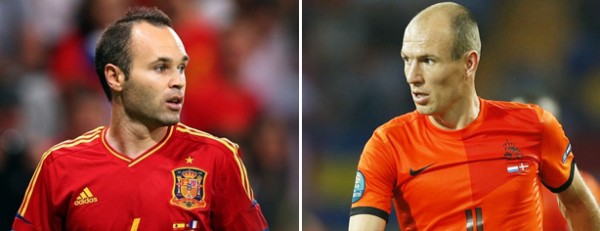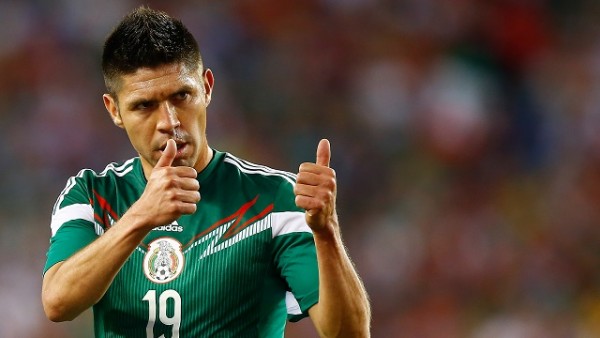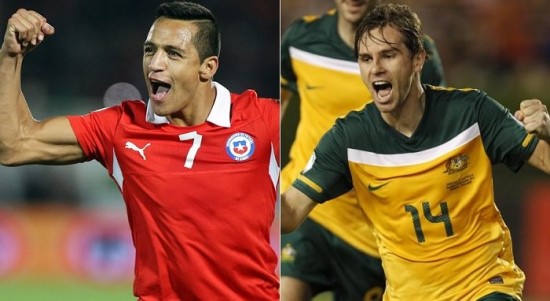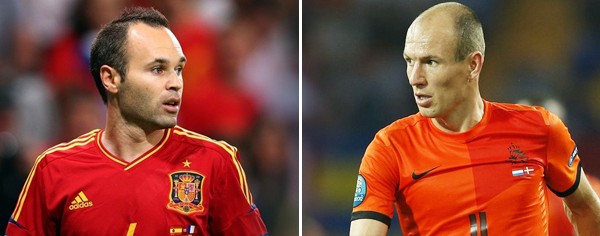
The second day of the 2014 World Cup isn’t just about the Group B headliner and a rematch of the previous final between Spain and the Netherlands, but also gives us the second match in Group A which should be enjoyable as Mexico play against Cameroon while we also have somewhat dark horse candidate Chile playing against Australia.
It’s a good opportunity for both Mexico and Cameroon to set themselves up for a qualifying spot. Anyone not playing Brazil right off the bat has that privilege. But both teams are flawed and with plenty of holes in their lineups and tactics, so it remains to be seen if they’ll be more busy hiding and protecting those issues or trying to attack them on the other side, which promises us an enjoyable match.
Mexico had scoring problems all through the qualifiers, and will most likely start with a 3-5-2 formation that uses Maza and Guardado as wing backs who constantly attack, especially Guardado. Giovani Dos Santos played a lot of minutes as striker this season at Villarreal, but will likely be behind Oribe Peralta, who should have an easier time in the air if the injury to Aurelien Chedjou will prevent him from playing. We might also see Miguel Layun on the left with his long range shooting ability, and Marco Fabian attacking from behind might also be vital for a team that can’t really afford to drop points in this match.

Cameroon rely on Samuel Eto’o and a physical midfield that will press high and hope to take advantage of their size and speed compared to the Mexican team. The problem for Cameroon will be scoring goals, which means Maxim Choupo-Moting has a lot riding on his ability to help out, while a weak defense needs to hope they won’t get Joel Matip dropping back to help N’Koulou because of the Chedjou injury, complicating things even further.
The big match of the day and possibly the biggest of the group stage is between the World Champions, Spain, and the team they beat four years ago in that physical final that went to extra time, the Netherlands. The Dutch are weaker than they were four years ago and will play with three centre backs while Nigel de Jong drops very close to them. As close as you can get to parking the bus, relying on Wesley Sneijder, Arjen Robben and Robin van Persie to lead a very young squad otherwise against players who have won everything.
The big question for Spain, as always, will be if they start with a striker or not. If they will, it means Diego Costa will be playing with Andres Iniesta and David Silva closer to him, while Xavi, Xabi Alonso and Sergio Busquets complete this amazing midfield unit, although Pedro might get the nod over Silva in the “front three”. There’s also a chance we see Cesc Fabregas, with him or Silva as a false nine.

This match is going to be as everyone expects: Spain having possession, hoping that through Jordi Alba’s running on the wing they’ll be able to make a quick start and create some space and width against a team that has no plan of exposing themselves against the best passing side in the world, but the Dutch have one flaw in their plan: Their defenders aren’t that good to feel completely confident about shutting Spain out.
Day 2 ends with Chile playing Australia, with the South Americans being clear favorites to pick up the 3 points and put pressure on either of the two group favorites. Chile are another team that plays with three centre backs but without the intention of parking the bus. Alexis Sanchez will play next to Eduardo Vargas of Valencia up front, while Mauricio Isla and Jean Beausejour support them from the wings.
For the Aussies, Tim Cahill remains their best option up front, which says something about the depth and quality of their side at this point in time. However, they have a very aggressive and tall side against the shortest team in the tournament, which means set pieces might become a very big factor in this match. If Australia score first, the Chileans, under a lot of pressure to start off with a win, might struggle playing their usual brand of free flowing football, which will also be affected by whether Jorge Valdívia starts or not, not to mention Arturo Vidal, who is questionable.
Who do Australia have besides Cahill? Tommy Oar from Utrecht will be important as he joins Cahill up front from time to time and the same can be said about Mathew Leckie who plays in the Bundesliga 2, providing danger off the right wing. There’s not too much attacking quality to this Australian side, but they have size, physicality and plenty of belief that they can do something in this tournament despite the unfavorable odds.
